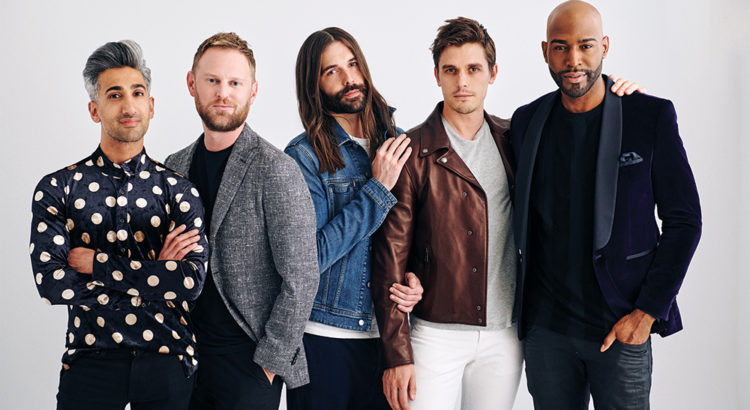“All things just keep getting better”. This is the optimistic proclamation of the show, Queer Eye, whose third season was recently released on Netflix. It is an optimism that, at first, is a little hard to swallow. In each episode, the Fabulous Five, five uniquely talented gay men, endeavor to change someone’s life. In this way, each episode is a little bit different, but also comfortingly similar. The Fab Five blitz into a messy house, into a messy existence and find solutions within their disciplines. Jonathon cuts away at hair to reveal the inner beauty within. Tan emphasizes the need for one’s style to match one’s personality instead of the current trends. Each repainted cabinet, each tailored suit, each seemingly minute change reveals a life that could be perfect if only we willed it to be. It really is that easy.
Self-care is the oft-proffered advice and the show’s thematic core. Each transformation is drawn from the inside first and foremost. Certainly, the Five’s methods may seem a little intrusive at the beginning, but they do so with care for the subject. The person at the center is exposed, made vulnerable so that they can grow in more than a superficial way. And it is refreshing to ask why a young man may have left his closet overflow instead of rushing to judge him for the mess. Perhaps the best quality about the Fabulous Five is their adaptable curiosity. Like any human beings, they rush to judgement and speak in generalities. But they are also willing to listen and participate in a conversation of differing perspectives, educating themselves and others simultaneously.
But even as I have re-watched episodes, eagerly sought out the countless charismatic interviews with the Fabulous Five, I have had my nagging doubts. Maybe it’s the show’s obsession with intimacy clashes with the performative nature of television. I cannot help but feel the cameras, subtly offscreen, urging certain storylines forward. For example, visual transformations are always pronounced, with sweeping room changes and dramatic hair reveals. Change happens fast, too. With only one hour allotted per episode and one week of filming allotted per subject, there is no time for a slow gestation. Everyone is encouraged to change as fast as possible, as dramatically as possible. But real life doesn’t move at a quick pace. The stagnation of each day, one after another, is a looming threat behind every episode’s happy ending. It seems too easy to revert to old habits once the cameras are gone. The show’s belief in change is its constant, but you must believe it too.



Leave a Reply
1 Comment on "Rennovating the Self"
Totally… there’s times where I just feel like the Fab Five are pushing the participants to take steps in their lives that aren’t genuine to their own choices… and to do so in the name of “self-improvement” feels disingenuous. Makes me wonder what the agreements are like behind the scenes– did the contestants already agree to this? Do they genuinely *like* the changes that go beyond makeover?